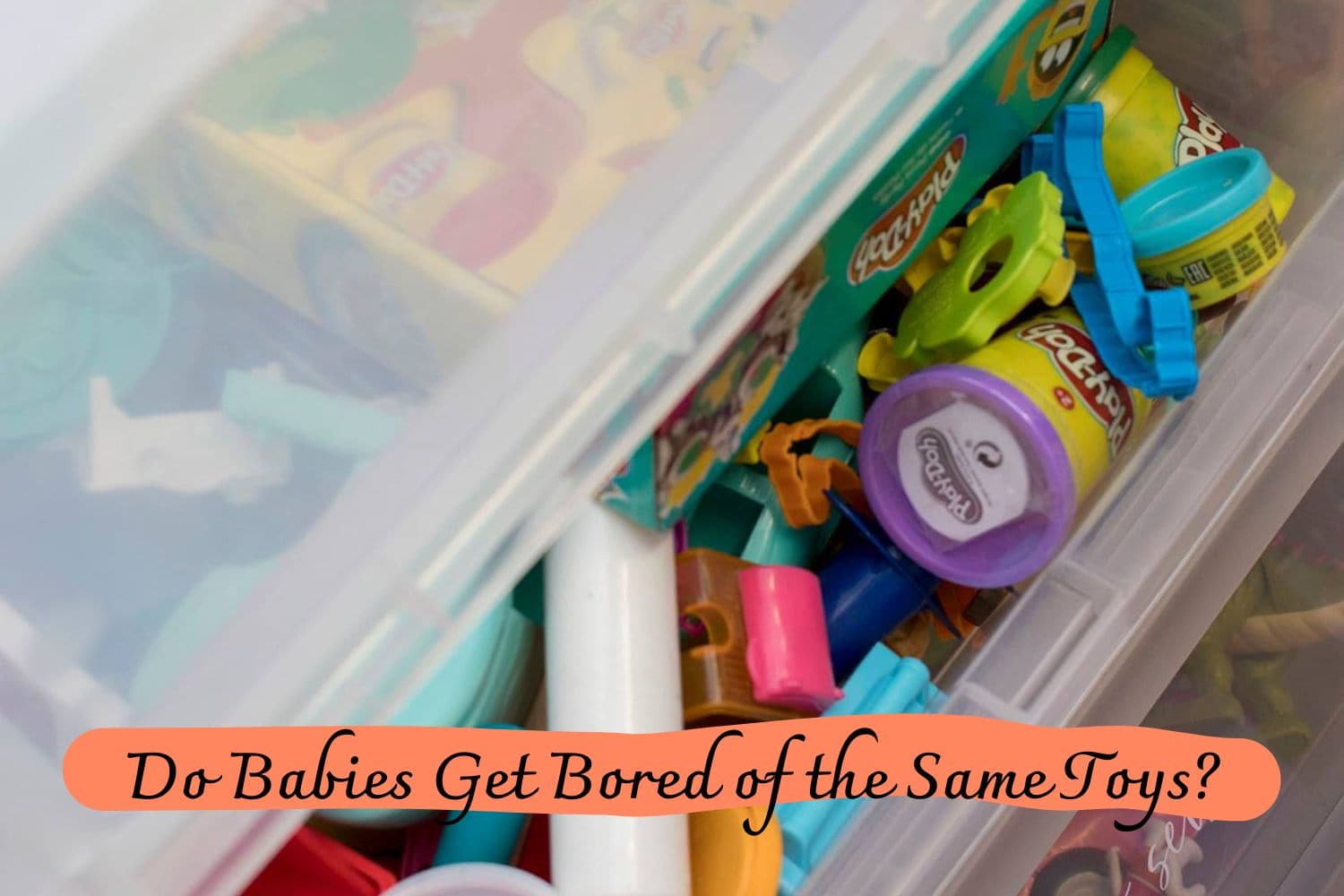Have trouble keeping your baby entertained but don’t want to add new toys every week? Find out – Do babies get bored of the same toys, and how to keep them stimulated?
Do Babies Get Bored of the Same Toys?
Are you a parent, guardian, or caregiver of a small child wondering if your sweet baby is getting bored with the same toys? You’ve gone to the toy store and knocked out all of the new options, yet every time you tuck away the playthings; they haven’t held their attention for long.
Maybe you find yourself asking: Do babies get bored of the same toys eventually?
The answer is yes – even though their attention spans may be short, little ones can still lose interest in those beloved objects after frequent playing.
In this blog post, we are diving into how to keep their spark alive by exploring why babies become disinterested and offering ideas on how to rotate out old items.
Read on for tips on avoiding unenthusiastic reactions from these occasionally fussy toddlers!
Do Babies Get Bored Their Toys?
As children become accustomed to their toys, their initial excitement and interest may wane. However, constantly replacing toys is not necessary. By employing simple strategies, you can ensure your child remains engaged with their toys for extended periods. Let’s explore some effective methods for achieving this.
Why Do Babies Get Bored of the Same Toys?
It might be because the toys are not appropriate for her stage of development. Play is crucial for a baby’s learning process, and if a toy is either too simple or too complex, she will likely lose interest.
During the first three months, your baby’s vision is still developing, making her more attracted to toys that move or produce sounds. Moving objects is easier for her to see, and sounds help her locate objects until her eyesight is fully matured.
When you engage with your baby, you naturally make exaggerated movements, facial expressions, and funny noises to keep her attention. These actions assist in keeping her focused on you.
As your baby reaches three months and beyond, she will begin to reach out and touch objects, thanks to improving hand-eye coordination. Toys that she can knock and make moves will bring her joy. Eventually, she will want to grab and hold her toys.
Around nine months, your baby will start patting, stroking, and poking her toys. By ten months, she will develop a love for hiding and dropping them. As she grows, her preference for toys will align with her developing skills.
It’s worth noting that overwhelming your baby with too many toys at once can hinder playtime. Having too many options will distract her, as she quickly moves from one toy to another without fully engaging. To help her focus, keep most of the toys out of sight and introduce them one at a time. If she shows no interest in a toy, put it away for later and try another.
Remember, even the best toys cannot replace quality time with you. If your baby is left alone with her toys, she may long for your presence and desire your active involvement in play.
How to Maintain Your Child’s Interest in Toys
1 – Choose open-ended toys – Many toys on the market can quickly become boring once your child masters how to play with them. At Shumee, we believe that play is 90% child and 10% toy. By giving your child open-ended toys that allow for multiple ways to play and minimal instructions, they will actively engage themselves to discover new ways to play, keeping their interest for longer.
2 – Explore new play techniques – If your child becomes bored with their toys, it may be because they have become accustomed to a certain way of playing. Introduce dishabituation by making small changes to how they play with the toys. For example, try using puppets and funny voices while telling a story or engage in role-play with your child. By adding variety and creativity, you will stimulate their minds and reignite their interest.
Our toys offer a variety of play options. For example, our unique chess set allows for both traditional gameplay and imaginative pirate and royal role-play. The Thirsty Crow set can be used for board games or storytelling and for creating other games with the crows!
3 – Toy swapping – If you have friends or family with children of similar ages, consider swapping a box of toys with them. This allows for fresh play options without the need to constantly buy new toys. Your child can still enjoy playing with these toys when they visit their friends or family.
4 – Embrace toy rotation – One of the most effective and popular methods to keep your child engaged in their playroom is toy rotation. Keep only a few toys out at a time and store the rest away. Periodically swap the toys that are available for play. Read on to learn more about the benefits of toy rotation and how to implement it successfully.
By implementing these strategies, you can ensure that your child remains engaged and interested in their toys, promoting their development and creativity through play.
Conclusion
With all of this in mind, it is obvious that babies do get bored of the same toys. Providing variety impacts how long your baby can stay engaged and be psychologically stimulated by their environment; however, you don’t need to break the bank for this.
There are plenty of low-cost or no-cost ways to make sure your baby stays interested in playtime. Don’t be afraid to get creative with household goods – old spoons, pots and pans, and cardboard boxes can often do the trick!
Most importantly, pay attention to your baby’s reaction when offered any activity or toy. If they seem disinterested after a few moments, switch it up and try something else. As parents, we must keep our children’s interests throughout playtime so that they can reach their developmental leaps each month with ease!
So next time you hear a yawn while playing with a favorite toy, take heed and add some excitement to the baby’s play area.
Thanks for reading our article Do Babies Get Bored of the Same Toys? If you want to know more information, visit our website here.
Read more:
Why does my baby seem restless and bored with her toys?
Babies Can Get Bored: Here’s How to Turn It Into a Good Thing
How To Tell When A Baby Is Bored — And What To Do About It
Are Plastic Toys Bad For Babies?

